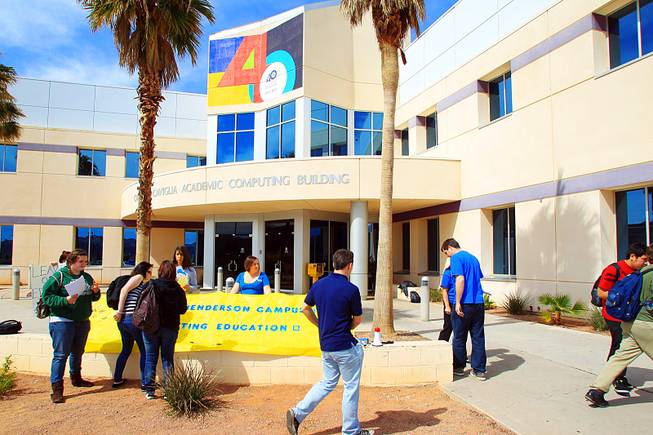
Las Vegas Sun
College of Southern Nevada students try to attract the attention of fellow students while protesting proposed budget cuts Tuesday, March 15, 2011, at CSN’s Henderson campus.
Wednesday, March 2, 2016 | 2 a.m.
Late last year higher education officials controversially voted to merge campus police at two Reno colleges with the UNR police department.
Then, last month, administrators proposed centralizing the Nevada System of Higher Education’s registration system. At that same meeting, the Board of Regents reaffirmed its vision for a strong, single system to oversee higher education in Nevada.
Now, system officials are considering whether the UNLV police department should take over enforcement duties for the College of Southern Nevada and Nevada State College.
Notice a pattern?
NSHE leaders say consolidating services is a way to stay efficient and save on overhead costs, but critics say it’s a defensive tactic designed to protect against future challenges to the system’s power.
“[It’s an attempt to] wind the system together to the point where it makes it very difficult to separate the institutions,” said John Gwaltney, former president of Truckee Meadows Community College in Reno. “I think any rational person that would look at it would come to the conclusion that it would make it difficult to separate the system.”
Dissatisfaction is reaching a fever pitch, and it’s an open secret in political and education circles that lawmakers are warming to the idea of shrinking the system’s control over community colleges during next year’s legislature.
Gwaltney, along with a small cadre of former community college presidents, is drafting legislation to present before lawmakers. On paper, the plans look similar to early efforts to break up the Clark County School District last year. One proposal, for instance, calls for a separate governing board for the state’s four community colleges as well as a local board that oversees each one, effectively eliminating the Nevada System of Higher Education and its Board of Regents from their oversight.
But Gwaltney and supporters of his group’s plan fear their efforts will be in vain the more community colleges become increasingly dependent on the system and larger universities for support.
Nevada System of Higher Education Chancellor Dan Klaich said the concerns are overblown, and noted that the system had been debating consolidation efforts for years.
“This isn’t about community colleges or police; what this is about is that state appropriations continue to get tighter,” he said. “It means we have an obligation to find as much savings as possible, and these things looked like relatively low-hanging fruit.”
Still, the police consolidation plan was unpopular with many at both UNR and TMCC. Regents are expected to approve the official police merger at meetings later this week, as well as discuss a proposal to create one platform where students can register and see classes at all NSHE institutions rather than having to register at each school.
Much of the recent dissatisfaction stems from the perception that the system prioritizes universities, particularly UNR, at the expense of community colleges. The system’s four community colleges, the College of Southern Nevada, Truckee Meadows Community College, Western Nevada College and Great Basin College, account for more than half of the college students in the state, but they are often disadvantaged by a funding formula skewed toward UNLV and UNR.
CSN, for example, is NSHE’s largest institution but faced budget cuts last year that, among other things, cut tutoring services during finals week.
“They talk about wanting to make savings, and where do they go first to make cuts? The community colleges,” Gwaltney said.
That’s not right, critics of the system say, in a state where community colleges are perfectly suited to churn out the kind of skilled workers needed to support new industries imported by companies like Tesla and Faraday Future.
“[We want] a separate board and our own budget that recognizes the fact that we don’t do research,” said CSN history professor Sondra Cosgrove. “They obsess about universities and research and sports … but teaching is the actual foundation of a higher education system.”
But system leaders argue the state has already had that discussion in the form of a legislative committee formed in 2013. Lawmakers tasked with investigating a break up of NSHE made a series of recommendations which Klaich said have already been implemented. Klaich’s own conduct during that process landed him in hot water, however, following allegations that he buried a report critical of the system.
“I’m not going to squelch anybody’s right to have an opinion, but the opinion has to be backed up by something that’s good for the state and the students,” Klaich said. “I haven’t heard the argument yet about why this is good for community colleges, the students in Nevada and the taxpayers.”
“What’s the benefit of creating an independent system with a set of high-paid administrators that don’t advance student success?” he added.
The main challenge for critics will be coming up with a new funding formula that benefits community colleges. It’s not an easy task, but it will be politically necessary in order to attract the support of lawmakers who are unlikely to throw money at a cause without a concrete plan.
“I think we’re getting very close to having to produce a formula that the legislators could be comfortable with,” Gwaltney said.

Join the Discussion:
Check this out for a full explanation of our conversion to the LiveFyre commenting system and instructions on how to sign up for an account.
Full comments policy